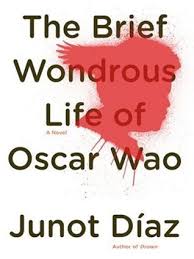 The book for April which was nominated by yours truly was The Brief Wondrous Life of Oscar Wao, the bestselling and Pulitzer Award winning novel by Dominican novelist Junot Diaz.
The book for April which was nominated by yours truly was The Brief Wondrous Life of Oscar Wao, the bestselling and Pulitzer Award winning novel by Dominican novelist Junot Diaz.
I commend to the reader my essay, the link to which can be found in the left column if you are viewing this on a computer screen. Those comments deal with why we should not shrink from reading admittedly coarse and contemporary novels such as this one. Oscar Wao is indeed packed with vulgarities and descriptions of brutalities that are difficult to stomach at times. But I argue that we should still read them, and that is in the essay.
The task here is to record some little trifle in memoriam of our April 2016 meeting. And the plums of the evening tended to be the various observations of the ways in which the Dominican Republic parallels Mordor under the dictatorship of Trujillo, the contemporaneous Sauron. In Oscar’s obsession with fantasy role playing games, fantasy novels, films, comics, etc., we find an epic fantasy world version of the horrors of 20th century tyranny.
Adding significant dimension and depth to the book, we see that Oscar adopts a new persona at the end. He goes to his own Mordor, the DR, on his own quest, for love perhaps, or at least for the physical act of love—a broken man on a broken quest of self-realization of the Dominican male stereotype of the poon hound.
An even more erudite observation made by first-timer Gerry was the striking parallel to Conrad’s Heart of Darkness: Oscar himself goes to the heart of DR darkness where at the end of the book instead of “the horror”, he is saying “the beauty…”
Most everyone conceded that the book was very good. Absent were encomiums of the highest tenor, elevating the book or its author to some pinnacle of immortality. It may have been the barrage of sex-laden vulgarities. Or the subject matter. Or something requiring greater introspection.
I grant myself the license as curator of this blog to wonder out loud if the psychology of interacting with universally acknowledged heroes of literature does not predispose us to favoring their work (Dickens and Dumas for example, authors whose ascendancy we routinely debate), while recent novelists, people with whom we share space and air, people appearing in the media, who could conceivably one day soon appear on Oprah, people whom death has not yet sealed away from sight so that  their work so that it can be the topic of dissertations, these novelists do not have the mindshare of the lovers of classic books in advance. What if, instead of Dickens, Junot Diaz had just written David Copperfield? Would we be more ready to pan it than we were last year when we read it?
their work so that it can be the topic of dissertations, these novelists do not have the mindshare of the lovers of classic books in advance. What if, instead of Dickens, Junot Diaz had just written David Copperfield? Would we be more ready to pan it than we were last year when we read it?
Or are we living in a post-literary time when our fully deconstructed culture is simply no longer capable of producing heroic writers? Or even if it were still producing great writers, they are not given a platform and publicity by publishing companies who historically had the tacit duty of selecting the pantheon of writers? Why? Because the enormous heard of wonky New Yorker-opinions in every publishing house that must sign off on a new book? Because of financial risk that incurs when one writer becomes too famous, thus too powerful to control?
Whatever the reason, the book was mostly applauded and enjoyed by all. Few expressed intention to seek out more Diaz fiction.
Winning the vote for June’s book was long-shot proposal The Good Earth by Pearl S Buck.
